Module 2 What can you do ? Unit 1 I can play the piano教学设计
文档属性
| 名称 | Module 2 What can you do ? Unit 1 I can play the piano教学设计 |
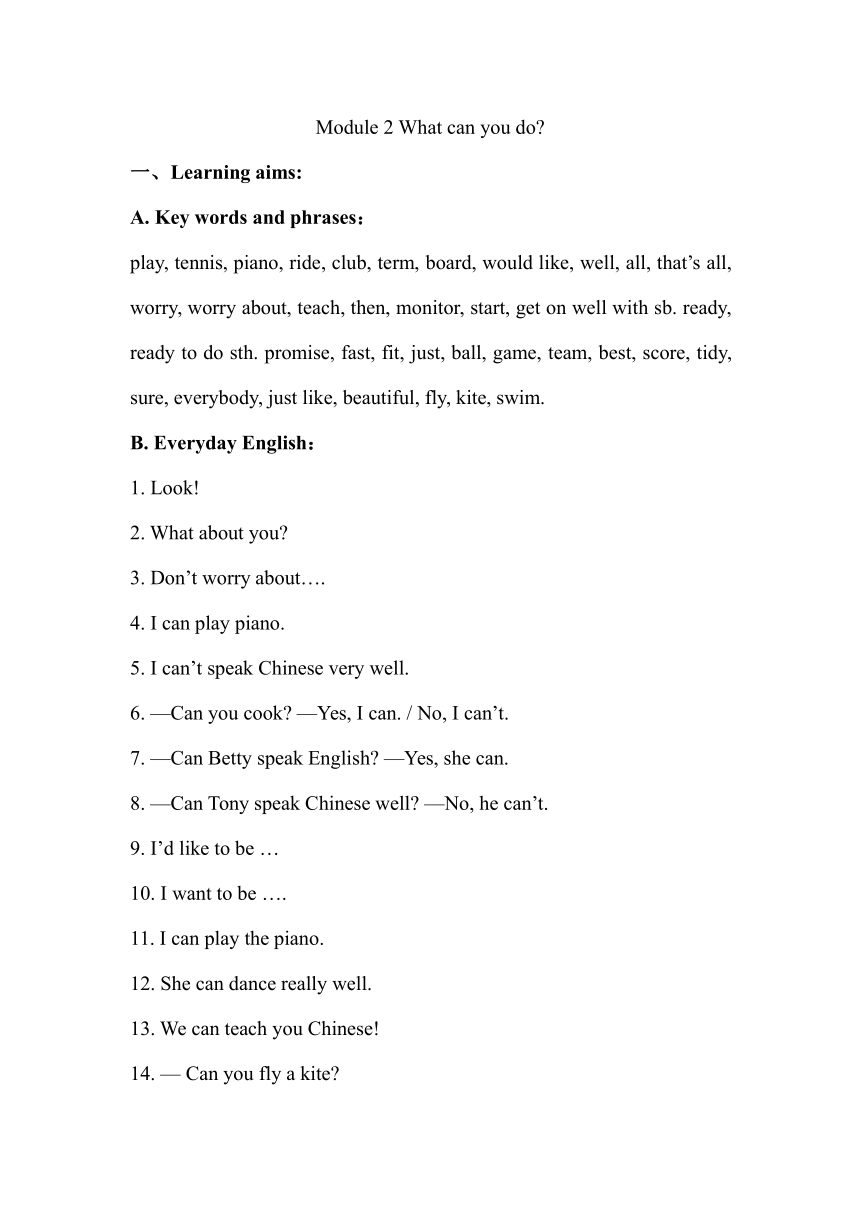
|
|
| 格式 | zip | ||
| 文件大小 | 24.4KB | ||
| 资源类型 | 教案 | ||
| 版本资源 | 外研版 | ||
| 科目 | 英语 | ||
| 更新时间 | 2015-03-24 00:00:00 | ||
图片预览

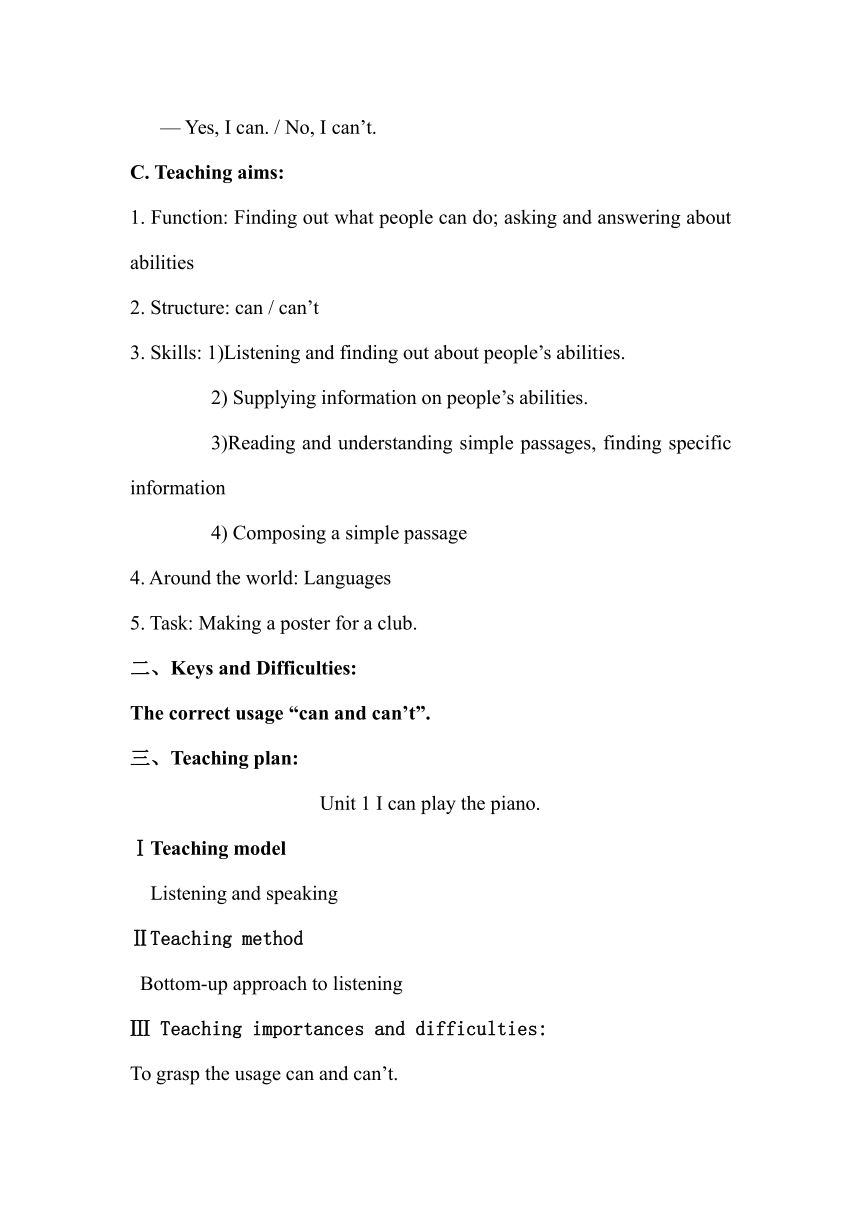
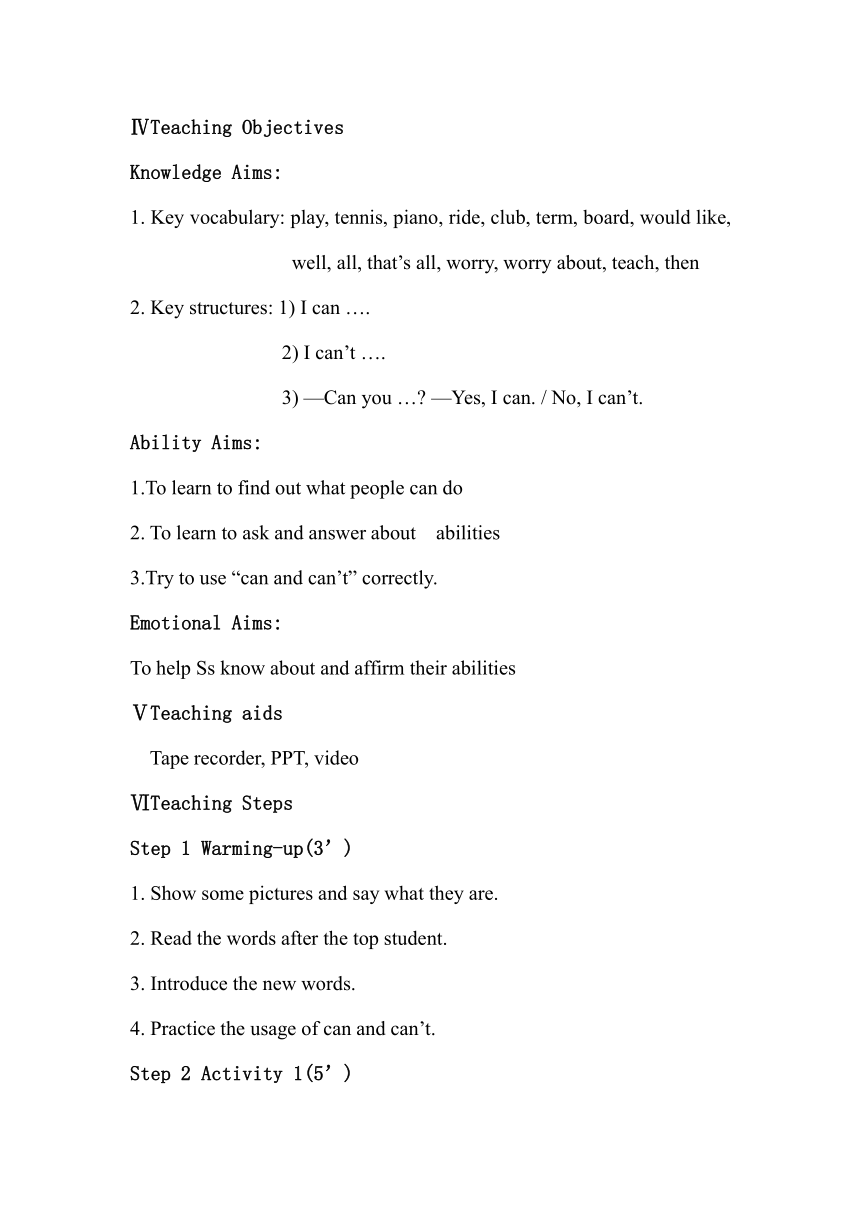
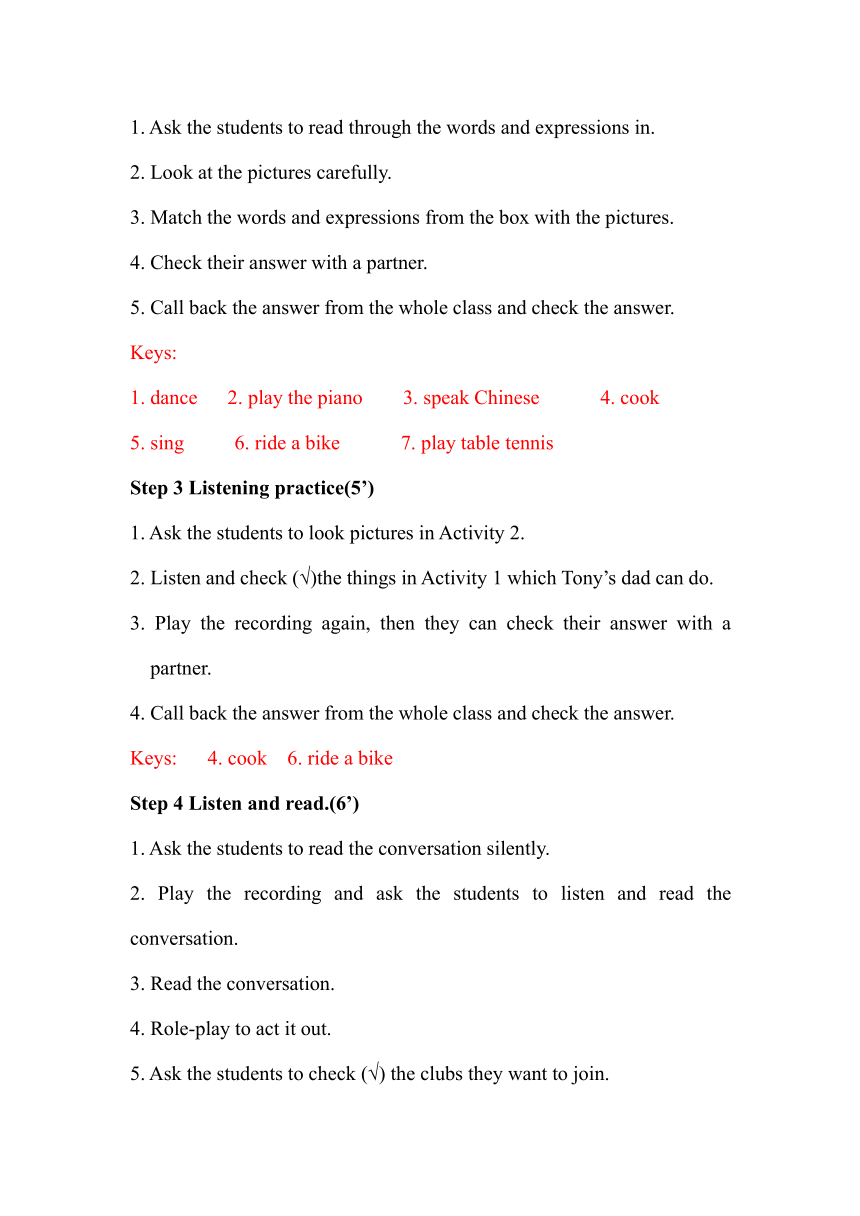
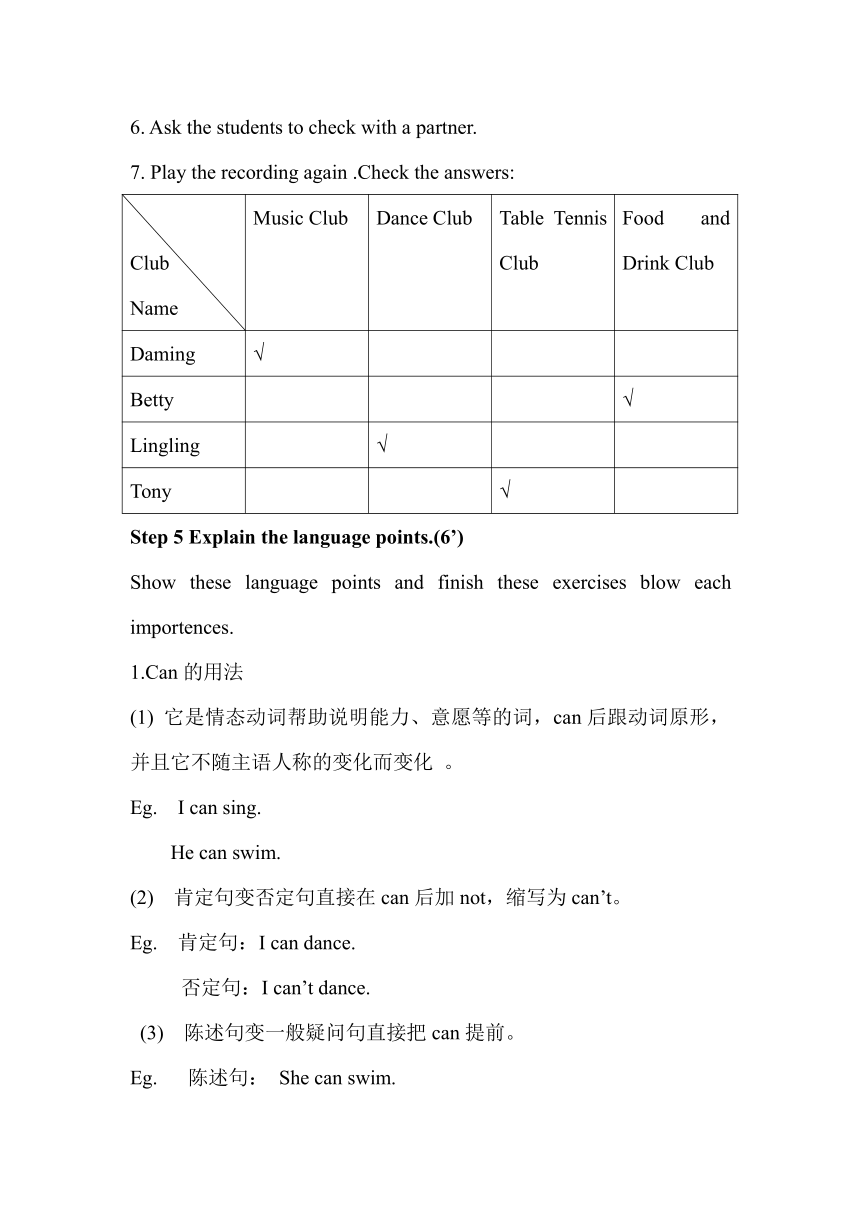
文档简介
Module 2 What can you do
一、Learning aims:
A. Key words and phrases:
play, tennis, piano, ride, club, term, board, would like, well, all, that’s all, worry, worry about, teach, then, monitor, start, get on well with sb. ready, ready to do sth. promise, fast, fit, just, ball, game, team, best, score, tidy, sure, everybody, just like, beautiful, fly, kite, swim.
B. Everyday English:
1. Look!
2. What about you
3. Don’t worry about….
4. I can play piano.
5. I can’t speak Chinese very well.
6. —Can you cook —Yes, I can. / No, I can’t.
7. —Can Betty speak English —Yes, she can.
8. —Can Tony speak Chinese well —No, he can’t.
9. I’d like to be …
10. I want to be ….
11. I can play the piano.
12. She can dance really well.
13. We can teach you Chinese!
14. — Can you fly a kite
— Yes, I can. / No, I can’t.
C. Teaching aims:
1. Function: Finding out what people can do; asking and answering about abilities
2. Structure: can / can’t
3. Skills: 1)Listening and finding out about people’s abilities.
2) Supplying information on people’s abilities.
3)Reading and understanding simple passages, finding specific information
4) Composing a simple passage
4. Around the world: Languages
5. Task: Making a poster for a club.
二、Keys and Difficulties:
The correct usage “can and can’t”.
三、Teaching plan:
Unit 1 I can play the piano.
ⅠTeaching model
Listening and speaking
ⅡTeaching method
Bottom-up approach to listening
Ⅲ Teaching importances and difficulties:
To grasp the usage can and can’t.
ⅣTeaching Objectives
Knowledge Aims:
1. Key vocabulary: play, tennis, piano, ride, club, term, board, would like, well, all, that’s all, worry, worry about, teach, then
2. Key structures: 1) I can ….
2) I can’t ….
3) —Can you … —Yes, I can. / No, I can’t.
Ability Aims:
1.To learn to find out what people can do
2. To learn to ask and answer about abilities
3.Try to use “can and can’t” correctly.
Emotional Aims:
To help Ss know about and affirm their abilities
ⅤTeaching aids
Tape recorder, PPT, video
ⅥTeaching Steps
Step 1 Warming-up(3’)
1. Show some pictures and say what they are.
2. Read the words after the top student.
3. Introduce the new words.
4. Practice the usage of can and can’t.
Step 2 Activity 1(5’)
1. Ask the students to read through the words and expressions in.
2. Look at the pictures carefully.
3. Match the words and expressions from the box with the pictures.
4. Check their answer with a partner.
5. Call back the answer from the whole class and check the answer.
Keys:
1. dance 2. play the piano 3. speak Chinese 4. cook
5. sing 6. ride a bike 7. play table tennis
Step 3 Listening practice(5’)
1. Ask the students to look pictures in Activity 2.
2. Listen and check (√)the things in Activity 1 which Tony’s dad can do.
3. Play the recording again, then they can check their answer with a partner.
4. Call back the answer from the whole class and check the answer.
Keys: 4. cook 6. ride a bike
Step 4 Listen and read.(6’)
1. Ask the students to read the conversation silently.
2. Play the recording and ask the students to listen and read the conversation.
3. Read the conversation.
4. Role-play to act it out.
5. Ask the students to check (√) the clubs they want to join.
6. Ask the students to check with a partner.
7. Play the recording again .Check the answers:
ClubName Music Club Dance Club Table Tennis Club Food and Drink Club
Daming √
Betty √
Lingling √
Tony √
Step 5 Explain the language points.(6’)
Show these language points and finish these exercises blow each importences.
1.Can的用法
(1) 它是情态动词帮助说明能力、意愿等的词,can后跟动词原形,并且它不随主语人称的变化而变化 。
Eg. I can sing.
He can swim.
(2) 肯定句变否定句直接在can后加not,缩写为can’t。
Eg. 肯定句:I can dance.
否定句:I can’t dance.
(3) 陈述句变一般疑问句直接把can提前。
Eg. 陈述句: She can swim.
一般疑问句:Can she swim
(4) 肯定回答: Yes,主语+can.
否定回答: No,主语+can’t.
1.) He can sing, ________ he can’t cook.
A. and B. so C. or D. but
2.) —Can Jim play basketball —____.
A. Yes, I can B. Yes, he can C. No, you can’t D. No, he isn’t.
3.) —Can you speak English well
— ______.
A. No, I can’t B. Yes, I have C. No, I don’t D. Yes, I speak
2. I’d like to join the Music Club because I can play the piano. 我想加入音乐社团是因为我会弹钢琴。
定冠词the用于西洋乐器前(民族乐器前不加)
play the piano 弹钢琴
play the violin 拉小提琴
中国乐器名词前不与冠词连用:
play erhu 拉二胡
进行球类运动、下棋不用冠词:
play basketball 打篮球
play volleyball 打排球
play football 踢足球
play chess 下棋
1) —Tina, are you going to play _____ chess on School Day
—Yes, and I’ll also play _______violin that afternoon.
A. the; the B. the; / C . / ; the D. /; /
2) John can play _______ guitar, but he can’t play _______ chess.
A. the; / B. / ; the C the; the
3. I think she’d like to join the Dance Club because she can really well. 我认为她想加入舞蹈俱乐部,因为她真的跳得好。
would like意为“想要”,其语气比用
like 婉转些。具体用法如下: 1) 后面接名词或代词,表示“具体要”某样东西。例如:
I’d like two sweaters for my daughters.
我想给我的女儿们买两件毛衣。
Would you like one of these mooncakes?你想要一块这样的月饼吗?
2) 后面接动词不定式,表示“愿望,喜爱”,常用于有礼貌地提出邀请、请求或建议。例如:I would like to be your class monitor.
我想当班长。
Would you like to come to supper?
你愿意来吃晚饭吗?
1.) 因为我喜欢打乒乓球,我选择了乒乓球俱乐部。
I ______ the Table Tennis Club _____________________ table tennis.
2.) Tom想加入音乐俱乐部,因为他会弹钢琴。
Tom _______________join the Music Club because he ________________.
4. Don’t worry about Chinese. 别担心中文。
worry about = be worried about 担心
Don’t worry about your son.
= Don’t be worried about your son.
不要担心你的儿子。
1. )我想加入英语俱乐部,因为我的英语说得不好。
____________the English Club _____________speak English very well.
2.) 不用担心你儿子,我会照顾他的。
__________________your son. I can look after him.
Step 6 Practice: Work in pairs.(5’)
1. Look at the information.
Can Can’t
Daming speak Chinese play the piano dance
Betty speak English cook play table tennis
Lingling speak Chinese dance cook
Tony play table tennis speak English speak Chinese well
2. Read through the example with the class.
—Can Betty speak English
—Yes, she can.
—Can Tony speak Chinese well
—No, he can’t.
3. Pair them to ask and answer.
4. Circulate and monitor their production.
Step 7 Guessing game.(5’)
1. Show some pictures.
2. According to the information given and ask the students to guess what it is.
3. Show the pictures to check the answers.
Step 8 Do exercises(5’)
一、单项选择:
( )1. —What can you do, Lingling —I can __________.
A. play the football B. ride bike C. play the piano D. play a basketball
( )2. I can sing English songs ________ I can dance.
A. and B. so C. or D. but
( )3. He can sing, ________ he can’t cook.
A. and B. so C. or D. but
( )4. —Can Jim play basketball —______________.
A. Yes, I can B. Yes, he can C. No, you can’t D. No, he isn’t.
( )5. —Can you speak English well — _________.
A. No, I can’t B. Yes, I have C. No, I don’t D. Yes, I speak
Keys: 1. C 2. A 3. D 4. B 5. A
二、完成句子:
1. Tony,你会说中文吗?
________ you _______________, Tony
2. 这学期新的俱乐部名单在公布板上。
The new clubs _______ this term_________________.
3. 我想加入英语俱乐部,因为我的英语说得不好。
_________the English Club ________speak English very well.
4. 不用担心你儿子,我会照顾他的。
______________________your son. I can look after him.
5. 因为我喜欢打乒乓球,我选择了乒乓球俱乐部。
I _______the Table Tennis Club _______________ table tennis.
6. Tom想加入音乐俱乐部,因为他会弹钢琴。
Tom ______join the Music Club because he _______________.
Keys:
1. Can. speak Chinese 2. for, on the board 3. I’d like to join, because I can’t
4. Don’t worry about 5. choose , because I like playing
6. would like to, can play the piano.
Step 9 Summary(3’)
Step 10 Homework(2’)
1.Do a survey. Ask your parents what they can do and what they can’t.
2. Recite words and expressions of Unit 1 and prepare the text of Unit 2.
Ⅶ Blackboard Design
Unit 1 I can play the piano.
cook, dance, tennis, piano, club, board, join, choose
play the piano I /He / She can +v.
play table tennis I/ He / she can’t + v.
ride a bike Can you/he/she +v. …
worry about Yes, I /he/she can.
No, I /he/she can’t.
一、Learning aims:
A. Key words and phrases:
play, tennis, piano, ride, club, term, board, would like, well, all, that’s all, worry, worry about, teach, then, monitor, start, get on well with sb. ready, ready to do sth. promise, fast, fit, just, ball, game, team, best, score, tidy, sure, everybody, just like, beautiful, fly, kite, swim.
B. Everyday English:
1. Look!
2. What about you
3. Don’t worry about….
4. I can play piano.
5. I can’t speak Chinese very well.
6. —Can you cook —Yes, I can. / No, I can’t.
7. —Can Betty speak English —Yes, she can.
8. —Can Tony speak Chinese well —No, he can’t.
9. I’d like to be …
10. I want to be ….
11. I can play the piano.
12. She can dance really well.
13. We can teach you Chinese!
14. — Can you fly a kite
— Yes, I can. / No, I can’t.
C. Teaching aims:
1. Function: Finding out what people can do; asking and answering about abilities
2. Structure: can / can’t
3. Skills: 1)Listening and finding out about people’s abilities.
2) Supplying information on people’s abilities.
3)Reading and understanding simple passages, finding specific information
4) Composing a simple passage
4. Around the world: Languages
5. Task: Making a poster for a club.
二、Keys and Difficulties:
The correct usage “can and can’t”.
三、Teaching plan:
Unit 1 I can play the piano.
ⅠTeaching model
Listening and speaking
ⅡTeaching method
Bottom-up approach to listening
Ⅲ Teaching importances and difficulties:
To grasp the usage can and can’t.
ⅣTeaching Objectives
Knowledge Aims:
1. Key vocabulary: play, tennis, piano, ride, club, term, board, would like, well, all, that’s all, worry, worry about, teach, then
2. Key structures: 1) I can ….
2) I can’t ….
3) —Can you … —Yes, I can. / No, I can’t.
Ability Aims:
1.To learn to find out what people can do
2. To learn to ask and answer about abilities
3.Try to use “can and can’t” correctly.
Emotional Aims:
To help Ss know about and affirm their abilities
ⅤTeaching aids
Tape recorder, PPT, video
ⅥTeaching Steps
Step 1 Warming-up(3’)
1. Show some pictures and say what they are.
2. Read the words after the top student.
3. Introduce the new words.
4. Practice the usage of can and can’t.
Step 2 Activity 1(5’)
1. Ask the students to read through the words and expressions in.
2. Look at the pictures carefully.
3. Match the words and expressions from the box with the pictures.
4. Check their answer with a partner.
5. Call back the answer from the whole class and check the answer.
Keys:
1. dance 2. play the piano 3. speak Chinese 4. cook
5. sing 6. ride a bike 7. play table tennis
Step 3 Listening practice(5’)
1. Ask the students to look pictures in Activity 2.
2. Listen and check (√)the things in Activity 1 which Tony’s dad can do.
3. Play the recording again, then they can check their answer with a partner.
4. Call back the answer from the whole class and check the answer.
Keys: 4. cook 6. ride a bike
Step 4 Listen and read.(6’)
1. Ask the students to read the conversation silently.
2. Play the recording and ask the students to listen and read the conversation.
3. Read the conversation.
4. Role-play to act it out.
5. Ask the students to check (√) the clubs they want to join.
6. Ask the students to check with a partner.
7. Play the recording again .Check the answers:
ClubName Music Club Dance Club Table Tennis Club Food and Drink Club
Daming √
Betty √
Lingling √
Tony √
Step 5 Explain the language points.(6’)
Show these language points and finish these exercises blow each importences.
1.Can的用法
(1) 它是情态动词帮助说明能力、意愿等的词,can后跟动词原形,并且它不随主语人称的变化而变化 。
Eg. I can sing.
He can swim.
(2) 肯定句变否定句直接在can后加not,缩写为can’t。
Eg. 肯定句:I can dance.
否定句:I can’t dance.
(3) 陈述句变一般疑问句直接把can提前。
Eg. 陈述句: She can swim.
一般疑问句:Can she swim
(4) 肯定回答: Yes,主语+can.
否定回答: No,主语+can’t.
1.) He can sing, ________ he can’t cook.
A. and B. so C. or D. but
2.) —Can Jim play basketball —____.
A. Yes, I can B. Yes, he can C. No, you can’t D. No, he isn’t.
3.) —Can you speak English well
— ______.
A. No, I can’t B. Yes, I have C. No, I don’t D. Yes, I speak
2. I’d like to join the Music Club because I can play the piano. 我想加入音乐社团是因为我会弹钢琴。
定冠词the用于西洋乐器前(民族乐器前不加)
play the piano 弹钢琴
play the violin 拉小提琴
中国乐器名词前不与冠词连用:
play erhu 拉二胡
进行球类运动、下棋不用冠词:
play basketball 打篮球
play volleyball 打排球
play football 踢足球
play chess 下棋
1) —Tina, are you going to play _____ chess on School Day
—Yes, and I’ll also play _______violin that afternoon.
A. the; the B. the; / C . / ; the D. /; /
2) John can play _______ guitar, but he can’t play _______ chess.
A. the; / B. / ; the C the; the
3. I think she’d like to join the Dance Club because she can really well. 我认为她想加入舞蹈俱乐部,因为她真的跳得好。
would like意为“想要”,其语气比用
like 婉转些。具体用法如下: 1) 后面接名词或代词,表示“具体要”某样东西。例如:
I’d like two sweaters for my daughters.
我想给我的女儿们买两件毛衣。
Would you like one of these mooncakes?你想要一块这样的月饼吗?
2) 后面接动词不定式,表示“愿望,喜爱”,常用于有礼貌地提出邀请、请求或建议。例如:I would like to be your class monitor.
我想当班长。
Would you like to come to supper?
你愿意来吃晚饭吗?
1.) 因为我喜欢打乒乓球,我选择了乒乓球俱乐部。
I ______ the Table Tennis Club _____________________ table tennis.
2.) Tom想加入音乐俱乐部,因为他会弹钢琴。
Tom _______________join the Music Club because he ________________.
4. Don’t worry about Chinese. 别担心中文。
worry about = be worried about 担心
Don’t worry about your son.
= Don’t be worried about your son.
不要担心你的儿子。
1. )我想加入英语俱乐部,因为我的英语说得不好。
____________the English Club _____________speak English very well.
2.) 不用担心你儿子,我会照顾他的。
__________________your son. I can look after him.
Step 6 Practice: Work in pairs.(5’)
1. Look at the information.
Can Can’t
Daming speak Chinese play the piano dance
Betty speak English cook play table tennis
Lingling speak Chinese dance cook
Tony play table tennis speak English speak Chinese well
2. Read through the example with the class.
—Can Betty speak English
—Yes, she can.
—Can Tony speak Chinese well
—No, he can’t.
3. Pair them to ask and answer.
4. Circulate and monitor their production.
Step 7 Guessing game.(5’)
1. Show some pictures.
2. According to the information given and ask the students to guess what it is.
3. Show the pictures to check the answers.
Step 8 Do exercises(5’)
一、单项选择:
( )1. —What can you do, Lingling —I can __________.
A. play the football B. ride bike C. play the piano D. play a basketball
( )2. I can sing English songs ________ I can dance.
A. and B. so C. or D. but
( )3. He can sing, ________ he can’t cook.
A. and B. so C. or D. but
( )4. —Can Jim play basketball —______________.
A. Yes, I can B. Yes, he can C. No, you can’t D. No, he isn’t.
( )5. —Can you speak English well — _________.
A. No, I can’t B. Yes, I have C. No, I don’t D. Yes, I speak
Keys: 1. C 2. A 3. D 4. B 5. A
二、完成句子:
1. Tony,你会说中文吗?
________ you _______________, Tony
2. 这学期新的俱乐部名单在公布板上。
The new clubs _______ this term_________________.
3. 我想加入英语俱乐部,因为我的英语说得不好。
_________the English Club ________speak English very well.
4. 不用担心你儿子,我会照顾他的。
______________________your son. I can look after him.
5. 因为我喜欢打乒乓球,我选择了乒乓球俱乐部。
I _______the Table Tennis Club _______________ table tennis.
6. Tom想加入音乐俱乐部,因为他会弹钢琴。
Tom ______join the Music Club because he _______________.
Keys:
1. Can. speak Chinese 2. for, on the board 3. I’d like to join, because I can’t
4. Don’t worry about 5. choose , because I like playing
6. would like to, can play the piano.
Step 9 Summary(3’)
Step 10 Homework(2’)
1.Do a survey. Ask your parents what they can do and what they can’t.
2. Recite words and expressions of Unit 1 and prepare the text of Unit 2.
Ⅶ Blackboard Design
Unit 1 I can play the piano.
cook, dance, tennis, piano, club, board, join, choose
play the piano I /He / She can +v.
play table tennis I/ He / she can’t + v.
ride a bike Can you/he/she +v. …
worry about Yes, I /he/she can.
No, I /he/she can’t.
同课章节目录
- Module 1 Lost and found
- Unit 1 Whose bag is this?
- Unit 2 Are they yours?
- Unit 3 Language in use
- Module 2 What can you do ?
- Unit 1 I can play the piano
- Unit 2 I can run really fast
- Unit 3 Language in use
- Module 3 Making plans
- Unit 1 What are you going to do at the weekends?
- Unit 2 We're going to cheer the players.
- Unit 3 Language in use
- Module 4 Life in the future
- Unit 1 Everyone will study at home
- Unit 2 Every family will have a small plane.
- Unit 3 Language in use
- Module 5 Shopping
- Unit 1 What can I do for you?
- Unit 2 You can buy everything on the Internet
- Unit 3 Language in use
- Module 6 Around town
- Unit 1 Could you tell me how to get to the Nationa
- Unit 2 The London Eye is on your right.
- Unit 3 Language in use
- Revision module A
- Module 7 My past life
- Unit 1 I was born in a small village.
- Unit 2 I was born in Quincy.
- Unit 3 Language in use
- Module 8 Story time
- Unit 1 Once upon a time….
- Unit 2 Goldilocks hurried out of the house.
- Unit 3 Language in use
- Module 9 Life history
- Unit 1 He left school and began work at the age of
- Unit 2 He decided to be an actor.
- Unit 3 Language in use
- Module 10 A holiday journey
- Unit 1 What did you do?
- Unit 2 This morning we took a walk.
- Unit 3 Language in use
- Module 11 Body language
- Unit 1 They touch noses!
- Unit 2 Here are some ways to welcome them.
- Unit 3 Language in use
- Module 12 Western music
- Unit 1 It's so beautiful!
- Unit 2 Vienna is the centre of European classical
- Unit 3 Language in use
- Revision module B
